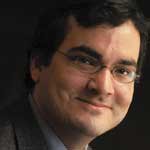Biotechnology & medicine
Mark Schnitzer
Sheds light on the functioning of individual brain cells

Global
Mijail Serruya
Connects brains directly to computers int he hope of helping paralyzed people communicate and control robotic aids

Global
Andre Koltermann
Speeds protein evolution to improve detergents, medicines, and foods

Global
Ron Weiss
Programs living cells to sense toxins ot create replacement tissues

Global
Anthony Lowman
Packs insulin into gel pills that could replace injections for diabetes patients
